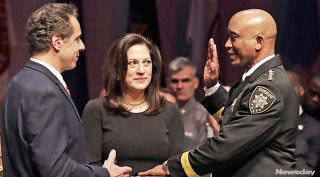Errol Toulon Jr., who in November was elected the first African-American sheriff in Suffolk County history, remembers clearly the first time he realized what it means to be black.
He was 5 years old and news of the assassination of Martin Luther King Jr. came on television in his Bronx home. He recalls watching his mother, Alma, cry and his father, Errol Sr., console her.
He also remembers his parents talking about what King believed in and how he stood up for those beliefs — and how that was viewed by others, including law enforcement officers.
“I realized I could or can be looked at differently just because of the color of my skin,” Toulon, 55, said.
The realization didn’t deter Toulon from entering law enforcement, but it shaped his philosophy on how to interact with others.
“Going forward I’ve always been one to . . . try and treat people the way I would want to be treated,” he said.
Toulon’s life at home off the Grand Concourse in the South Bronx with his parents and younger brother, Anthony, was stable and family-centered. His father was strict, he said, and the boys were required to be home by a certain time. If they got a little too caught up in an after-school game of baseball or basketball, Toulon and his brother had to make a mad dash for home.
Other kids “would see us running and would yell, ‘Beat the clock!,’ like the game show,” he said with a laugh.
Toulon’s mother worked for the New York City Department of Education and his father was a deputy warden at Rikers Island jail.
“They kept us pretty grounded and focused,” he said. “We were told at a young age we would go to college.”
Toulon said one of his most vivid memories is his parents going back to school while working, his mother obtaining a bachelor’s degree and his father two master’s degrees.
The example of perseverance that his parents instilled in him helped prepare Toulon for life’s curveballs. He’s repeatedly faced down life-threatening illness, including pancreatic cancer.
Toulon’s childhood was relatively free of racism, he said. Classmates at Cardinal Hayes High School were mostly white, but he always felt accepted. He said his first exposure to racism was during his junior and senior years of high school, when he landed the plum job of batboy for the New York Yankees.
The prejudice Toulon experienced as the team’s only African-American batboy didn’t come from players or management, but from fans angry when they didn’t get tossed foul balls. Toulon said the rules then didn’t allow him to give out balls.
“You would hear things that made you realize that you were different or people saw you as being different,” he said of the fans. The incidents made him “hypersensitive to being treated differently only because of the color of your skin and also because you’re just following the rules,” he said.
Toulon’s views on race became further nuanced when he attended Kingsborough Community College in Brooklyn. Finding fellow black students, Toulon sought out their friendship. But, he said, he was rejected because he wasn’t Haitian or Jamaican. Instead he turned to his baseball teammates, who were mostly Italian, and they became his “band of brothers.”
“Those are the guys I hung out with or stayed over their houses if it was a late game,” he said. “And they became my best friends to this day.”
After receiving his associate degree in 1982, Toulon became an officer with the New York City Department of Correction. In 1990, he and his wife, Susan, a fellow correction officer who was white, decided to buy a home on Long Island to create a better life for their sons, Errol III and Justin.
The couple began looking in Smithtown, but Toulon was concerned about being one of the few African-Americans in the community. His real estate agent assured him that as long as he maintained his property, he would be fine.
The couple bought a house in Lake Grove, and Toulon said he’s come to find “some of the best people in the world are my neighbors.”
But not everyone in the community was accepting.
In 2007, Toulon said he heard someone yell the N-word outside his house and then a loud explosion. Someone had blown up his mailbox. Police investigated but no one was ever arrested.
Toulon said he was concerned for his family’s safety, but never considered moving.
In 2009 he decided to run for the Suffolk County Legislature. Wearing slacks and a dress shirt, he walked door to door handing out his card. While in a Nesconset neighborhood, he suddenly found himself descended on by several police officers — even an aviation unit — and asked why he was in the community.
He showed officers his shield and cards. The police informed him that they had gotten phone calls about a black man breaking into homes.
“They were very professional, they weren’t aggressive,” he said. But the incident shook Toulon to his core.
“It was like a punch in the gut,” he said. “I was wondering what I had gotten myself into.”
The event occurred about the time black Harvard University professor Henry Louis Gates Jr. was arrested in Cambridge, Massachusetts, while trying to unjam his own front door and when Omar Edwards, a black NYPD officer, was shot dead by a white cop. Edwards, off-duty and in street clothes, had been chasing a man who broke into his car.
“So naturally, there was a little bit of fear for my own safety in that community,” he said. “It took me a week to try to figure out what I wanted to do and whether I wanted to continue.”
He decided to stay in the race, but started bringing someone white with him whenever he went door to door. He also started going to the local precinct to tell them whenever he would be canvassing.
Officers told him it wasn’t necessary, he said, “but I told them from my standpoint, it was.”
During the recent campaign for sheriff, which Toulon, a Democrat, won in a close race, he again faced racism, this time in the form of derogatory memes and videos with racist undertones. Still, Toulon said he sees his victory as the county’s first black sheriff as an indication that race was not a factor, and that voters chose “someone they believed in and that they believe had the experience to do the job they want done.”
The sheriff’s department, with 1,200 correction officers, deputies and civilian employees, is responsible for running jails in Yaphank and Riverhead. Among other duties, the department handles evictions and patrols highways on the East End.
Toulon counts his two bouts with cancer — lymphoma in 1996 and pancreatic in 2004 — and his first wife’s death from lupus, an autoimmune disease, in 2013 as his toughest battles, though he also faced death in 2006 when he developed a cardiac condition due to chemotherapy that resulted in him being given last rites. But in facing adversity, Toulon said he remains determined.
Pancreatic cancer forced Toulon to retire as a correction captain and left him depressed. He turned to education.
“School was my therapy,” he said. “I just threw myself into it. It gave me some focus, something to do.”
He received a master’s degree in business administration from Dowling College and began another master’s in homeland security management, then decided to get a doctorate in education at Dowling.
He said his parents always said each generation has to do better than the previous one. He couldn’t outrank his father, he said, so he decided to out-degree him.
After serving two years as Suffolk assistant deputy county executive for public safety, Toulon returned to the NYC Department of Correction in 2014 as deputy commissioner of operations.
Last year Toulon joined four other NYC correction employees in a lawsuit against the department, charging racial discrimination that the lawsuit states led to Toulon’s forced retirement in January 2017. The case is pending in U.S. District Court, records show.
Toulon — who in 2016 married his second wife, Tina — makes a point of going to schools every week to speak about bullying, drugs and gangs and “get to kids before they get to me.” A longtime community hockey coach, he said he hopes that as sheriff he can “break down many barriers” to racial harmony, as he has done in the hockey rink.
Toulon said he recognizes there are people who fear other races, and he does his best to be a good example of a role model who strives for excellence. Still, he acknowledged that the pressure to always represent your race can be a burden.
“I’m not going to lie,” he said. “It is extremely difficult because of not only the demand but to make sure you’re always on top of your game, always at your best.”

